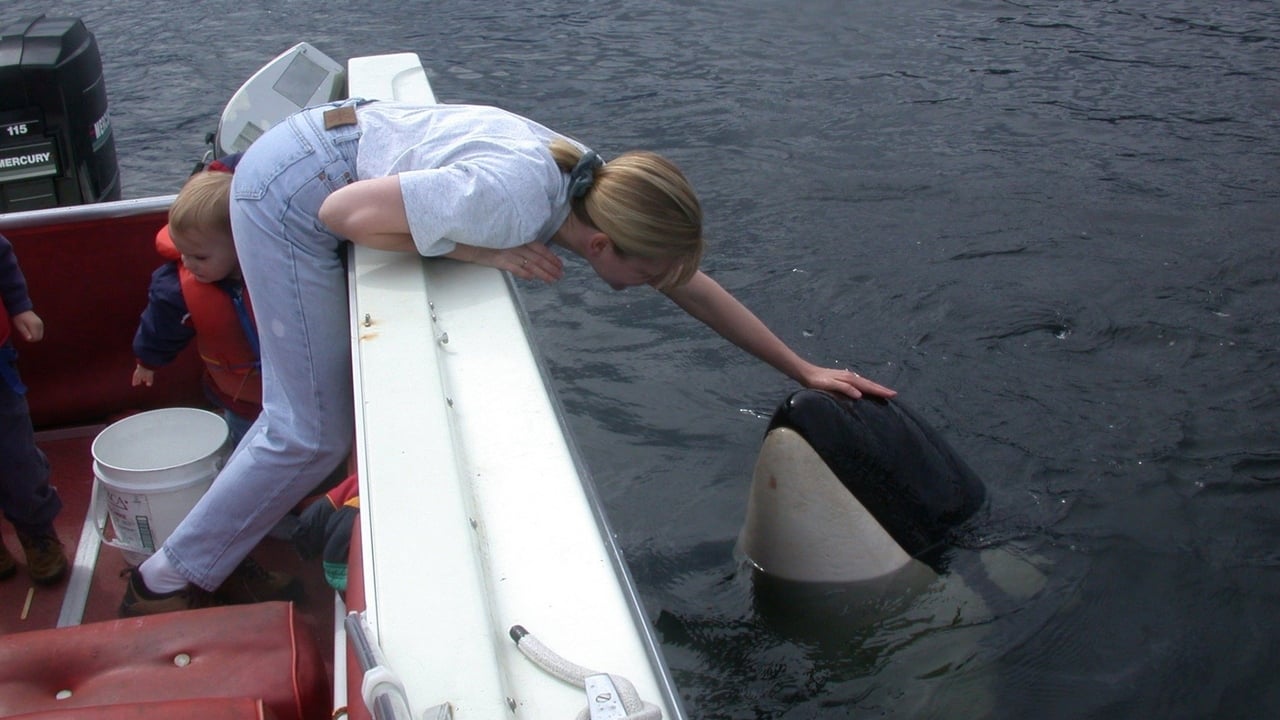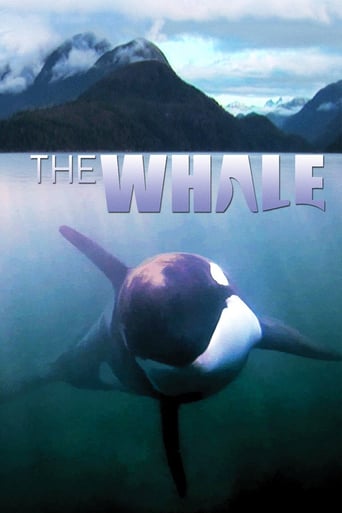TrueJoshNight
Truly Dreadful Film
Lidia Draper
Great example of an old-fashioned, pure-at-heart escapist event movie that doesn't pretend to be anything that it's not and has boat loads of fun being its own ludicrous self.
Stephanie
There is, somehow, an interesting story here, as well as some good acting. There are also some good scenes
Sarita Rafferty
There are moments that feel comical, some horrific, and some downright inspiring but the tonal shifts hardly matter as the end results come to a film that's perfect for this time.
jwaugh-ethics
"The Whale" is a documentary where its subject material transcends what is otherwise a very middling documentary. I think you can get most of how I feel about the movie from that sentence alone. It is a documentary where everything is on cruise control, the narrator guides you from event to event, people are interviewed and sometimes they cry, there are scenic helicopter shots repeated ad nauseam, and some Native Americans show up to say something vaguely spiritual. This really wouldn't be worth much if the subject matter, an orca named "Luna" trying to make some friends, wasn't so strong. As such, it ends up being more than the sum of its parts.This documentary is the story of an orca that got separated from its family. Very early on we learn from a less zany Ryan Reynolds (as the narrator) that orcas stay with their families for their entire life. Alone, and without social contact, Luna stumbles upon, and makes a home of, a place called Nootka Sound. In this stretch of sea it befriends the locals and draws some controversy, as many have differing opinions on what should be done about this whale. The main tension of the documentary comes from the idea that the orca should be left alone, despite its want for attention. Those who hold this view the orca as a liability or safety concern, and state that it is even detrimental to interfere with this whale's life. The other side of this is that Luna is just trying to make a connection, and it is cruel to deny him that.The documentary does a good job at exploring this bizarre relationship that a community has with this orca. It is touching and sad to see how much it desires attention. The orca will come up to side of boats, and seems to revel in the experience of being gawked at and touched. A lot of the documentary is moving because Luna himself is so surreal, and the interactions between him and everyone is playful and practically human. There is something innately understandable to us concerning the want for companionship. Luna just wants to be friends, and it is heartbreaking because he really does not understand the controversy that goes on around him. You get wrapped in the story so much because of this. This is by far the best aspect of the movie, and it is worth watching because of it.Unfortunately, the documentary itself has a made for TV feel to it. Ryan Reynolds does an OK job as the narrator, but sometimes his lines feel corny and lack substance. Actually, a much better fit for narrator would be Michael Parfit, who is he director of the movie and was also a journalist who wrote about Luna. In his brief speaking moments he would often say things that are more profound and thought provoking than anything Reynolds said in the entire movie. Further, while there is tension in the film concerning the real safety concerns that an orca in habituated waters draws, the documentary remains oddly neutral despite an obvious skew. I wish it made a stand, or an accusation, or anything. There was clearly something wrong with how this was handled by the government, but it is only hinted at through slight frustration. I did not want an attack or a diatribe, but it failed to analyze what went wrong and how it could have been better.Lastly, I am tired of watching a documentary where the narrator will say something vaguely scientific and random pieces of journal or newspaper articles will fly toward the screen, sometimes with highlighted words. It is a stupid effect, and it highlights the fact that this movie is only a little scientific and spends too much time on building Luna up as some sort of mysterious entity, almost mystical. The analogy between Luna and an extraterrestrial is made one too many times. We get it, it's a stranger in a strange land kind of story. So, let it speak for itself and stop beating me over the head with it.To sum it up, "The Whale" is worth watching because the story itself is provoking and rightfully pulls at all of those humanoid emotional strings. It ends up transcending a documentary that, by itself, is rather poorly produced.
Kyndl Brunson
One of the earlier reviewers got it all wrong. The people who were excited about Luna and saw his "friendship" as a gift were the people who were trying to get him relocated. The government is the one who said no. The government also made it illegal to interact with Luna (to the tune of a $100,000 fine). There was nothing anyone could do unless they broke the law to get Luna relocated.Long story short, this film really captures this sentient being and the lives he touched along the way. It really makes you question whether we do things because they are for the good of the animal or for what we THINK is good for the animal.The next pill to swallow is when all Luna wanted was companionship and then the people in Nootka Sound left him alone and "ditched" him due to laws being imposed, yet still he continued to trust and seek out the companionship no matter how fickle and fair weather the humans in his life were.I think there is something valuable to be taken from this film no matter age, gender, etc.
Tracy Allard
It made me so sad watching this movie. Sad to the point of tears, but even more so: angry. I simply can't believe how selfish humans can be. This poor baby Orca so badly wanted to be with his pod. Instead, humans insisted he remain their playmate. The DFO, upon the very first contact, should have relocated him to his pod (instead of three years later). The DFO lady interviewed in the film was thinking along the proper biological lines, but forgot to act upon them fast enough. It's not like his pod was unknown... his pod is known, identified, tracked, his birth was identified early on.We relocate bears, wolves, cougars, reptiles, birds, we relocate all animals in need of their groups if they belong to species which aren't in excessive numbers. We even relocate them sometimes when they ARE in excessive numbers (certain birds, alligators).But no, here the human greed to be able to say "I touched it" was more important than the Orca's need to be with his pod. The idiots in the movie kept talking about "friendship", but it wasn't friendship, it was "acquaintance" only! Luna wasn't looking for friendship in that superficial human way that we see on Facebook or between kids with cell phones. He needed the intense bonding 'friendship' of his pod, something no human on earth can possibly give him.The death of Luna should loom heavily on the conscience of every single selfish citizen who fought to keep Luna away from his pod. It should also loom heavily on the government, for failing in its role of protector of wildlife.Luna was essentially murdered by parasitic misguided human TLC. If we found a child in a shopping aisle (as the movie in the beginning compares), would we pass it along from human to human, for the human enjoyment of gooing and awing over it instead or returning it to its family? In some ways it reminds me of the little Cuban boy who landed in Florida a few years ago, and whom the community wanted to keep away from his family, in Florida, for political reasons... all the while his father in Cuba wanted him back. This poor kid got jostled around the legal system for over a year before he was returned to his Cuban family.
jdesando
"There's more there than most of my guests." Hotel Owner Cameron ForbesI doubt if there is a more authentic and endearing documentary in recent memory than The Whale, the story of young killer whale Luna, separated in 2003 from his pod and spending six years befriending the folks who live in the Nootka Sound on the west coast of Vancouver Island.The tension that makes this film more like a drama than a documentary is the dilemma of what to do with this unusually friendly Orca, which experts believe will not end up well because of its affection for humans. Or its need for community, judging from its almost constant desire to be seen, heard, and touched. Watching Luna go nose to nose with humans, letting them stroke its tongue, and virtually singing to them is to understand why even a fish and wildlife pro could violate his own division's ban on interaction.The opposing forces seem to arise naturally: those, especially natives, who want nature to take its course and those who foresee doom for the sea creature unless means such as giving him to a sea-world-type park are immediately taken. Intellectually the latter, especially the marine biologists, seem to have the better argument, but the former are powerful when they argue the whale should be allowed to do what it wants.Although most involved are powerless to effect the right solution, the occurrence of communication between humans and animal is carefully noted, an extraordinary example of a bond that seems to be built on both sides' need to understand and communicate with the other.If you see the film, I dare you to deny that you weren't moved by Luna's playing with humans and uncertain about how to solve his fate. For sure you will not remain unmoved.Praise to Ryan Reynolds as the perfect narrator not channeling Morgan Freeman. Most honors should go to filmmakers Suzanne Chisolm and Michael Parfit, who stayed with Luna through it all. Their devotion and love make this one of the most memorable documentaries ever.

